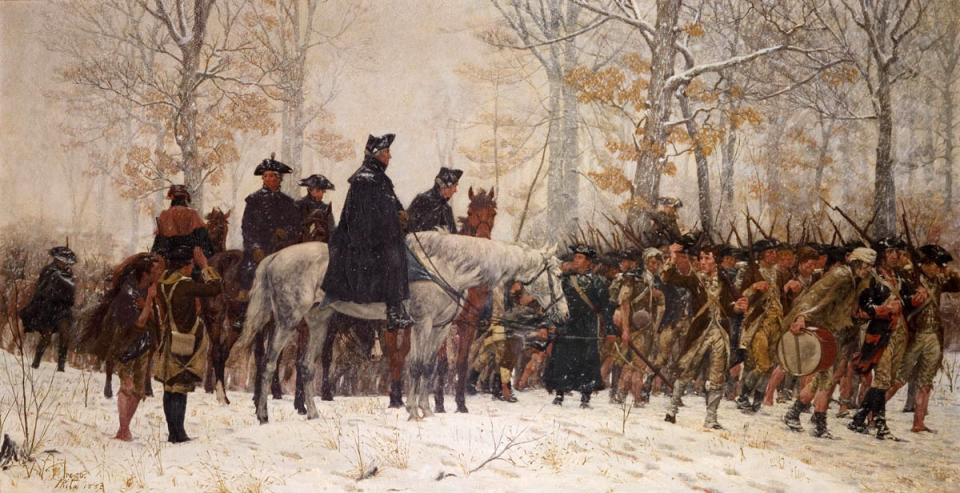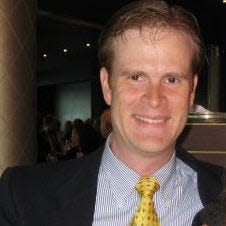Historically Speaking: Connecticut’s soldiers slog into Valley Forge
- Oops!Something went wrong.Please try again later.
- Oops!Something went wrong.Please try again later.
Following the Battle of Whitemarsh outside of Philadelphia between Dec. 5 and 8, 1777, General Jedediah Huntington of Norwich and his brigade of Connecticut soldiers marched on Dec. 11 under orders from General George Washington. They began that day a 13-mile slog over eight days in their weakened and cold bodies over the hills and through the woods towards their new winter encampment at Valley Forge.
Back in November, Congress had picked the date of Dec. 18 as a national day of Thanksgiving. Washington’s orders on the 18th mentioned “the chaplains [are to] perform divine service with their several corps and brigades.” This Thanksgiving took place after the army had spent a week encamped at the Gulph, four days of which were spent freezing under the stars or clouds without pitching tents. Surgeon Waldo spoke of the extreme lack of food. Private Joseph Plumb Martin (a soldier from Milford, Connecticut, who would publish a memoir in early 1800s) later recalled the irony that the starving troops were rewarded on Thanksgiving with “half a gill of rice [2 ounces] and a tablespoonful of vinegar.”

The very next day, Dec. 19, Washington and his army rode – and stumbled – several miles from the Gulph into Valley Forge. “We arrived at the Valley Forge in the evening. It was dark; there was no water to be found and I was perishing with thirst,” reminisced Private Martin.
Valley Forge would be their home for the next six months.
The day after they arrived, Huntington took the time to write a descriptive letter to his father to share the news with all of the family. It was the first of what would eventually be scores of letters he wrote over the next six months from Valley Forge. It is likely that neither he nor Washington knew exactly how many months they would remain there beyond April. Luckily for Huntington, he would have some surprise breaks from the dreary life of that famous, long winter.
On the 20th, Huntington penned to his father, Jabez Huntington, “Honored Sir, We are set down for the Winter unless the Enemy are pleased to open new scenes for us. This place is on the south side of the Schuykill about one mile from it and 21 from Philadelphia”
On Dec. 22, Huntington penned a letter to one of his classmates from the Harvard Class of 1763, Timothy Pickering of Massachusetts, who had been at Whitemarsh with him. Years later, Pickering served as the Secretary of State under Presidents Washington and Adams. The letter reads as follows:
“I have used every Argument my Imagination could invent to make the Soldiers easy, but I despair of being able to do it much longer—When they have their Allowance, the Beef has no Fat and the Proportion of Bone so great that it does not suffice Men who have been used to be full fed, the Spirit of stealing and robbing, which God knows was great enough before, must increase if no other bad Consequences follow.”
As for his suffering soldiers, he yearned to see them clothed and fed. “A large number of blankets were told are arrived at the southward. Congress have made another fair promise as to clothing, but it is as yet upon paper only. I wish the Army could see something real. The Connecticut troops are the best clothed of any, but they are more indebted to their State than the Continent.”
Huntington also wondered what the future would bring for the Patriot army. “I am very anxious to know the intentions and plans of Congress respecting another campaign. I hope measures will be entered into to convince the Enemy we are in Earnest…”
Huntington’s arrival at Valley Forge produced a flurry of letters home to his family, for he also took the time between labors to write his brother Andrew on the state of affairs at the new encampment at Valley Forge.
“I wish I could tell you I was coming to see you, instead of that I am going to build me a House in the Woods. What do you think of the Army’s making two thousand Log Houses in all the regularity of an encampment [?]”

Note: These letters of Jedediah Huntington are taken from The Huntington Papers, transcribed and published by the Connecticut Historical Society in 1923.
Next week: The portrait of Captain Jabez Huntington of Norwich
Damien Cregeau is a professional historian with many publications. He has a talk on Alexander Hamilton available online via C-SPAN. Mr. Cregeau lives in a historic house in Norwich.
This article originally appeared on The Bulletin: Historically Speaking: Connecticut’s soldiers slog Into Valley Forge

